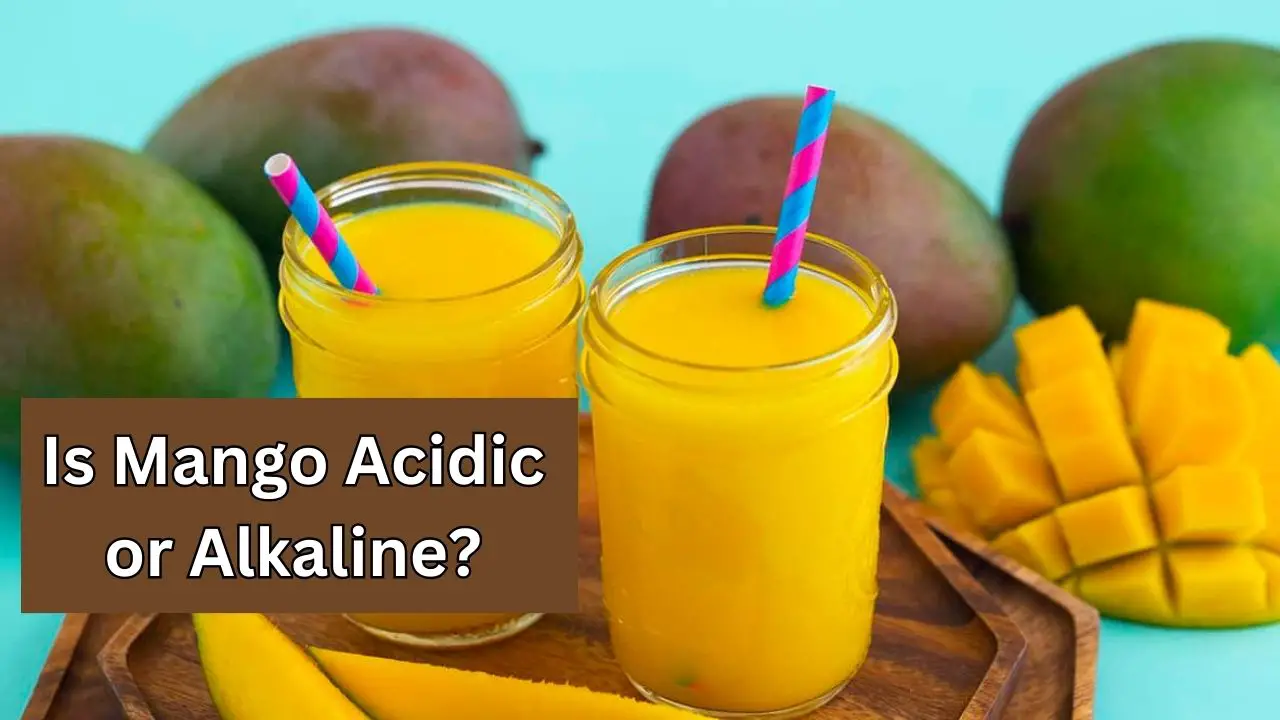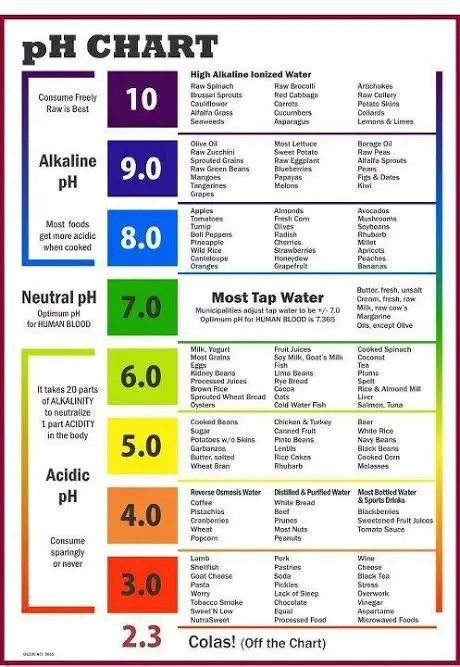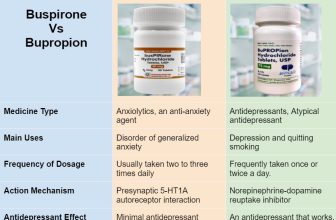Is Mango Acidic or Alkaline: Know The Truth Before Consumption

Mango is one of the most delicious foods everybody craves for. People consume this versatile delicacy in many forms, such as sweet, sour, spicy, and whatnot! But for health purposes, it is important to know if mango is acidic or alkaline.
Undoubtedly, Mangoes are not alkaline. But it’s slightly acidic. However, this acidity depends on the variety of the fruit, its ripeness, and growing conditions. The fruits are slightly acidic, with a pH of 3.40 to 4.801. This acidity is due to malic acid and other organic acids in the fruit.
So, in this article, we will discuss the pH level of mangos’ different forms. Also, we will enlighten you with the nutritional value of mangoes. After reading the article, you will learn the suitable mango type according to your health condition as per pH value.
Is Mango Acidic, Alkaline, or Neutral?
Mango is so close to neutral, but in general, it’s slightly acidic. To have a clear idea of the pH level of what you are consuming is a good practice. Especially if you have specific concerns about its impact on your health.
So, before knowing whether the fruit is acidic or alkaline, learn the basics of pH scale measurement.
| pH value | Status |
| 0 – 6.99 | Acidic |
| 7 | Neutral (like water) |
| 7.1 – 14 | Alkaline/Basic |
Well, for your convenience, here is a table regarding the pH value of different types of mangoes. Hope, this is going to help you.
| Mango Types | pH level |
| Alphonso | 3.4 – 4.0 |
| Green Mango | 3.40 – 4.80 |
| Ripe Mango | 5.80 – 6.00 |
| Ataulfo | 4.00 – 4.20 |
| palmer | 3.5 – 4.5 |
| Keit | 3.80 – 4.10 |
| Bombay | 3.8 – 4.6 |
| Haden | 4.50 – 4.80 |
| Valencia | 4.0 – 5.0 |
| Manila | 3.5 – 4.5 |
| Kent | 4.30 – 4.50 |
| Tommy Atkins | 3.70 – 3.90 |
| Francis | 4.00 – 4.10 |
So, what do you think is mango acidic or basic? Evidently its clear that Mango is acidic.

Acid in Mango
Mango is not all about its taste, right? When you are enjoying eating this, it’s essential to know its other facts, too, like a trace of citric acid. Yes, any mango contains acid, whether raw ripiped, or cooked. You can already know the fruit is acidic just by tasting this, as it tastes a little sour. Though ripe mangoes are less sour than raw mangoes, all of them contain acid.
Is Mango Acidic in The Stomach?
Mango is not acidic in the stomach. So, does mango alkalize your body?
Definitely yes! Mangoes have an alkalizing effect on the body due to their high mineral content. Particular potassium in it plays a crucial role in maintaining the acid-base balance in bodily fluids. It controls the balance between acids and bases. Consuming mangoes helps buffer excess acidity and maintain a more alkaline environment.
Other minerals like magnesium and calcium in the fruit also play a role in their alkalizing effect.
Is Mango Juice Acidic?
Mango juice is slightly acidic, just like whole mangoes. Obviously, the exact pH level of mango juice depends on the ripeness of the mangoes. In addition, it depends on the ingredients added during the juicing process.
Generally, the pH level of the juice is 3.4 to 4.8. It is mildly acidic. This level of acidity is the cause of the tangy flavor. It’s worth noting that many commercial juices are processed. Besides, they add sweeteners or citric acid, which affect the overall acidity and taste of the juice.
Which Is More Acidic, Green Mangoes or Ripe Mangoes?
Despite ripe mangoes’ overwhelming sweet and juicy taste, it has a sourness that kicks in your taste bud. So, are ripe mangoes acidic? Definitely it is. But the green mangoes are more acidic than the ripe mangoes.
However, according to one study, mangoes that are yet green have a pH of 4.12. While ripe mangoes have an average pH of 5.80.
According to the study of Frontiersin, more malic, oleic, tartaric, citric, and tannins are present in green mangoes. The sour flavour of fruits is caused by the organic acid malic acid. The polyphenolic substances known as tannins, on the other hand, have a bitter and astringent flavour.
Why Does Mango Hurt My Stomach?
Mangoes are low in fiber and high in natural sugar. Moreover, mangoes have sugar-like fermentable carbohydrates. Microorganisms easily ferment these.
However, excessive consumption of the fruit causes more active microorganisms that cause problems like bloating, vomiting, and diarrhea, which triggers IBS irritable bowel syndrome (IBS) and upsets the digestive system.
Also, the unripe one contains tannins. Tannins in unripe mangoes lead to stomach discomfort when consuming them.
Is Mango Pickle Acidic or Alkaline?
Mango pickles are generally acidic in nature. The acidity in pickles comes from vinegar, lemon juice, or tamarind. These are used in the pickling process to preserve the mangoes and give the pickle its tangy flavor.
As we said before, the pH level of pickles depends on the recipe and ingredients used. But it tends to be significantly more acidic than fresh mangoes. The acidity in pickles not only imparts flavor but also acts as a natural preservative. Additionally, it helps to extend the shelf life of the pickle.

Source: Masalacorb
Is Dried Mango Acidic?
Dried mango is generally slightly acidic in nature. The acidity in dried one primarily comes from the citric acid. When mangoes are dried, the water content is removed. Only the fruit’s flavors and nutrients remain in them, including its acidity.
The pH level of dried mango depends on the ripeness of the fruit before drying. Also depends on additives, and processing methods. However, in general, the dried one tends to have a pH level of 3.17 – 3.68. You can see, it has a greater acidity than fresh ones.

Source: Ginginanddry
Mangoes for Acid Reflux
Mangoes are a complex topic when it comes to acid reflux. While some people with acid reflux find that mangoes worsen their symptoms, others tolerate them well. However, it’s important to be aware of the acidity in pickles. Especially if you have a sensitive stomach. Also remember, if you have dietary restrictions related to acidity.
As we know, mangoes are naturally acidic fruits. They sometimes cause acid reflux that lead to heartburn or gastroesophageal reflux disease (GERD).
But the fact is; people generally tolerate ripe mangoes better because they tend to be less acidic.
However, eating a lot of mangoes at once increases the chance of experiencing acid reflux symptoms. Here are some suggestions if you want to eat mangoes but have acid reflux or GERD:
- Choose ripe mangoes, as they are less acidic comparatively.
- Consume less.
- Consider your personal tolerance. If you notice that mangoes cause aches, avoid them.
- Pay attention to how you prepare mangoes. Avoid adding acidic ingredients or spices (like citrus or chili) that could worsen reflux.
Mango Smoothies for Heartburn
When you heard about mango smoothies, you immediately thought of exotic, cool, and sweet drinks. But the truth is that for some people, especially those who already have heart problems, smoothies cause heartburn or make it worse.
Heartburn depends on several factors. If your smoothie is made of green mango, the acidic level is different from the ripe mango. As we said before, green mango is more acidic than the ripe one. So, heartburn depends on which type of smoothie you are taking.
A banana and papaya smoothie is more suitable for those who have heartburn issues rather than taking a mango smoothie.
Frequently Asked Questions (FAQs)
Are cooked mangoes acidic?
Cooking mangoes can alter their flavor and texture. But it generally doesn’t significantly change their acidity. Mangoes are naturally acidic fruits. Evidently, their acidity remains relatively consistent whether they are eaten raw or cooked. But it is a different fact if you boil mango and strain out the water. Except in this case, the acidic level remains almost the same.
Are mangoes acidic for babies?
Yes definitely. As an adult, a person maintains a stable pH level generally. The respiratory system of an adult regulates pH by increasing breathing rate and removing excess carbon dioxide. Also, the renal system controls the pH in the blood-balancing buffer. Conversely, babies are born with immature physiological systems as mangoes are acidic, so babies mostly fail to control their pH levels after intake. And causes problems like abdominal aches and acid reflux.
Is mango good for gastric problems?
It’s a crucial thing to answer because some people have acid intolerance issues. But in general, mangoes are a good source of dietary fiber. Thus, it is beneficial for digestion. As we know, fiber controls bowel movements and can alleviate constipation, a common gastric problem.
In addition, mangoes contain enzymes like amylases. These enzymes can aid in digestion by breaking down carbohydrates. However, some people are sensitive to these enzymes, so it’s essential to monitor how your body responds, how acidic, and the quantity of mangoes you are consuming in one sitting. Otherwise, mango intake in moderation is helpful for gastronomical issues.
Is mango acid on the skin effective?
Yes! The alpha hydroxy acids (AHAs) in mango exfoliate the skin removing dead skin cells. Also promotes smoother complexion breaking down the bonds between dry skin cells with chemical components. You will get fresh, new, brighter skin through the acid in mango.
Conclusion
In conclusion, hope now it’s clear: Is mango acidic or alkaline? Though there are so many debates about whether mango is acidic or neutral, ultimately, the truth is mango is acidic. In some cases, it might indicate a neutral pH level, but generally, it would show any changes made during the preparation and processing. If you have any digestive issues, only eat ripe, processed; otherwise, eat every bit you want of it in any form.






